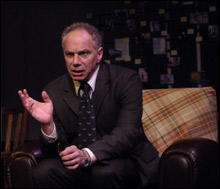Via Dolorosa ; Calvin Berger
By CAROLYN CLAY | September 5, 2006

VIA DOLOROSA: Ideas or stones? Ideas or stones? |
Via Dolorosa, British playwright David Hare’s eloquently reported account of his 1997 fact-finding mission to Israel and the Palestinian territories, is not up to the minute. But that’s hardly the point. In traversing the “neat, perfumed streets” of the Israeli settlements or taking in the “nicotine-yellow” smoke above Gaza, talking along the way to politicians and artists on both sides, Hare sought not just the facts of the ancient, ongoing conflict but insight into emotions and ideology that contribute to a passion not felt by his own kind. Western Civilization, he shrugs: “an old bitch gone in the teeth.” By contrast, an Israeli friend claims he experiences in a single day “events and emotions that would keep a Swede going for a year.” Via Dolorosa, then, is both an attempt to achieve understanding of the seemingly irresolvable divisions in the Middle East and a lament for the shallowness of much of the rest of the world, “where no one believes in anything.” The playwright himself performed the piece in 1998 in London in 1999 in New York. But he can’t make a career of spreading his findings like some ambassadorial Johnny Appleseed. He is, after all, a writer, not an actor, and he’s “always tried to get Judi Dench to do this sort of thing.” At the Berkshire Theatre Festival, where the work continues through October 21, with a detour to Brandeis University September 14-17, we don’t get Judi Dench but we do get Elliot Norton Award–winning actor Jonathan Epstein standing in for Hare. Epstein told the Boston Globe that his own experience of the material is necessarily different from Hare’s, citing his experience of Yad Vashem, Israel’s museum of the Holocaust, where “I have family whose names are written there and he doesn’t.” Hare is Church of England–bred (he gets his digs in there in the 1990 Racing Demon), but the actor’s ethnicity doesn’t really skew the piece, which serves as a mouthpiece for the people Hare encountered on both sides of the conflict, from Benni Begin, son of former Prime Minister Menachem Begin, to Palestinian historian Albert Aghazerin, from Jewish-American settlers Sarah and Danny Weiss to “poet of the Intifada” Hussein Barghouti.
Since Hare is now a character being played by an actor, director Anders Cato frames the piece as a play. The setting is Hare’s study, its cluttered desk, big leather chair, and stacks of books backed by a skeletal display of photographs and a cyc on which, at beginning and end, a shadowy suggestion of individuals caught up in the conflict appears to a swell of Middle Eastern music. Epstein enters in coat and tie, presenting a hesitant Hare unaccustomed to performing. As his tale heads into the heat of Israel and Gaza, so seemingly does he, removing coat and tie and rolling up his sleeves, only to re-dress as he heads back to England for the play’s coda of a taxi ride through “leafy street after leafy street, with sleeping houses, sleeping bodies, sleeping hearts.”
 Related
Related:
Material girls, Hare belles, Good Stuff, More 
- Material girls
The usually evenhanded if impassioned David Hare in The Secret Rapture , a 20-year-old play being urgently, elegiacally revived by Trinity Repertory Company.
- Hare belles
With apologies to Winston Churchill, The Breath of Life is a cliché wrapped in an enigma — or two. On the face of it, award-winning British writer David Hare's ruthless yet sentimental two-hander (at Gloucester Stage through August 2) is a standard confrontation between a betrayed wife and her husband's long-time mistress.
- Good Stuff
News and exposés about the Iraq war have been draining us mosquito-style over the years.
- Stamping grounds
Theresa Rebeck’s new Mauritius makes philately seem almost as exciting as the activity it sounds like.
- The Secret Rapture at Trinity Repertory Company
David Hare's The Secret Rapture , which Trinity Repertory Company is presenting through March 29.
- Best on the boards
Huntington Theatre Company artistic director Nicholas Martin recently announced that he would leave his post in 2008.
- Best on the boards
Huntington Theatre Company artistic director Nicholas Martin recently announced that he would leave his post in 2008.
- Players and painted stage
It seems the fall theater season was shot from a gun this year, barely after the Labor Day picnic baskets had been packed away.
- Play by Play: March 27, 2009
A compilation of theater productions in and around Boston
- Play by Play: March 20, 2009
A compilation of theater productions in and around Boston
- Serious business
Playwright and director Moisés Kaufman likes to say that Oscar Wilde was the first performance artist.
- Less

 Topics
Topics:
Theater
, Jonathan Epstein, Austin Lesch, Edmond Rostand, More  , Jonathan Epstein, Austin Lesch, Edmond Rostand, Jose Delgado, Cyrano de Bergerac, Gillian Goldberg, Jerry Bock, Johnny Appleseed, Church of England, The Knesset, Less
, Jonathan Epstein, Austin Lesch, Edmond Rostand, Jose Delgado, Cyrano de Bergerac, Gillian Goldberg, Jerry Bock, Johnny Appleseed, Church of England, The Knesset, Less 